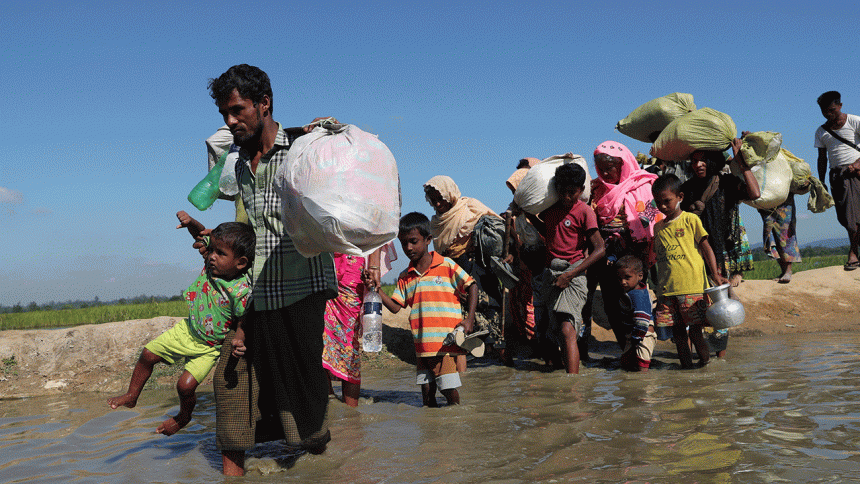Rohingya Repatriation: China’s role as mediator very crucial

China's role in Rohingya repatriation is turning out to be a decisive factor in resolving the crisis as the country embarked on the role of a mediator between Bangladesh and Myanmar and is likely to continue it until a solution is found, analysts have said.
The country has taken up the role as the international community's pressure on Myanmar has yielded nothing concrete so far.
A member of the UN Security Council and also a close ally of Myanmar, China is trying to establish its global standing as well as maintain and increase its economic and geopolitical influence on Myanmar, the analysts observed.
On Tuesday, China brokered a tripartite virtual meeting, generating hope in Bangladesh of starting the repatriation by June this year, about four years after the influx of some 750,000 Rohingyas to Bangladesh following a military crackdown in Myanmar's Rakhine State in 2017.
The UN Security Council also could not take any concrete measures to hold Myanmar accountable as China and Russia opposed any such move. Since the beginning of the crisis, China has been seeking a bilateral solution instead of making it a major issue in multilateral forums.
International relations analysts say Bangladesh signed a bilateral deal with Myanmar on repatriation in 2017 on suggestions from China and India, two Asian powers having strong bilateral relations both with Bangladesh and Myanmar.
"The international community has issued a lot of statements, but has not come to mediate on the issue on the ground. Against this backdrop, China is bringing Myanmar and Bangladesh to the negotiation table for talks," said Prof Imtiaz Ahmed of international relations department at Dhaka University.
The process actually began when a ministerial-level tripartite discussion was first held in New York on the sidelines of the UN General Assembly in September last year. An official-level talk was held in Dhaka in January last year.
Imtiaz said China has a lot of influence on Myanmar and it is expected to bring about a positive result. Failure of the tripartite mechanism would be a discredit to China, he told this newspaper yesterday.
Following Tuesday's hour-and-a-half virtual meeting, led by Chinese Vice Foreign Minister Luo Zhaohui, Myanmar Deputy Minister Hau Do Suan and Bangladesh Foreign Secretary Masud Bin Momen, officials said China is very interested in resolving the crisis bilaterally.
"We have faith in China as it is a powerful country. It is also a matter of credibility for China," Masud said.
Chinese Foreign Minister Wang Yi's recent visit to Naypyitaw and raising the Rohingya issue also means a lot, he added.
The foreign secretary said Myanmar has shown flexibility during the discussion on Tuesday and spoke in a positive tone after Dhaka's assertion that a lot of development activities and regional connectivity projects were being hampered due to the unresolved Rohingya crisis.
Analysts say Myanmar, facing a genocide case at the International Court of Justice in The Hague for atrocities against Rohingyas, also faces the UN rights body through the Universal Periodic Review this year. These factors might also have led Myanmar to think differently.
The tripartite meeting on Tuesday decided to hold a joint working group meeting next month and then the secretary- and ministerial-level tripartite meetings to sort out unresolved issues on Rohingya repatriation and arrangements before starting the repatriation in the second quarter of the year.
Munshi Faiz Ahmad, former chairman of the Bangladesh Institute of International and Strategic Studies (BIISS), said a number of countries and organisations have influence on Myanmar, especially India, China, Japan, European Union, Singapore and ASEAN. They all had a chance to help mediate on resolving the Rohingya crisis, but none have done so, except for providing humanitarian assistance.
He said Rohingyas want guarantee of citizenship and safety in Rakhine, and China can be a guarantor.
"I would propose that China leads formation of a joint international taskforce, which will monitor the overall repatriation process and creation of conducive environment in Rakhine," said Faiz, also a former ambassador.
With the presence of such an international body, Rohingyas would have confidence in returning to Myanmar, he said.
Also, another confidence-building measure for the Rohingyas would be the full rehabilitation of the internally displaced Rohingyas already in Rakhine, he added.
Prof Imtiaz suggested that Myanmar takes up a rigorous programme to interact with the Rohingyas in Cox's Bazar for building confidence.

 For all latest news, follow The Daily Star's Google News channel.
For all latest news, follow The Daily Star's Google News channel. 



Comments